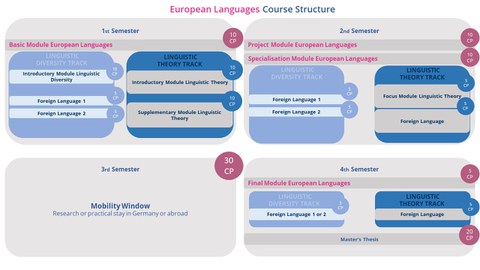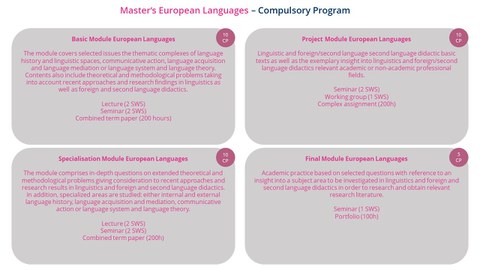Course structure
Table of contents
(valid from 1.10.2020 as the start of enrollment)
Overview of the course structure
The standard period of study for the Master's degree course in European Languages is four semesters. The course has a modular structure and concludes with the Master's thesis. A total of 120 credit points (CP) are earned upon successful completion of the course. The modules of the course are divided into compulsory and compulsory elective modules. The Master EuroS has two tracks: track "Language Theory" and track "Language Diversity". The choice of track is made at the beginning of the program.
Explanations of the modules
Compulsory modules
The same compulsory modules are provided in both tracks.
Compulsory elective area
The selection of compulsory elective modules depends on the track selection.
Compulsory and elective modules in both tracks
The two diagrams below show the module structure in the Language Diversity track and the Language Theory track.
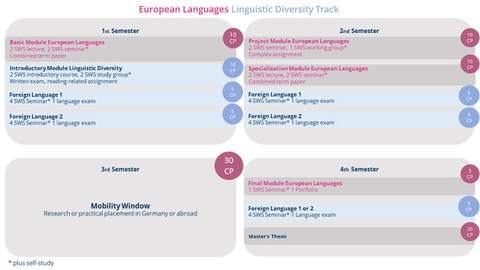
Pflicht- und Wahlpflichtbereich im Track "Sprachenvielfalt"
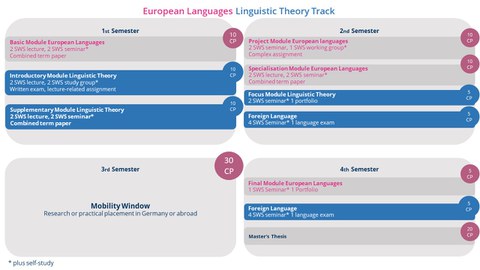
Pflicht- und Wahlpflichtbereich im Track "Sprachtheorie"
Compulsory courses
Regardless of which track you choose, there are three compulsory courses in the degree program that are attended by all EuroS students in the year. These are the "Workshop Theorie" (working group in the introductory module of both tracks, 2 SWS) in the first semester, a colloquium (working group in the project module, 1 SWS) in the second semester and the "Abschlusskolloquium" (seminar in the final module, 1 SWS) in the fourth semester.
Language course selection
The language selection in the new EuroS (new study regulations from October 2020) is based on the tracks. If you are studying the Language Theory track in the EuroS, you will choose two of 23 compulsory elective modules. A module can be chosen more than once if the languages chosen are different.
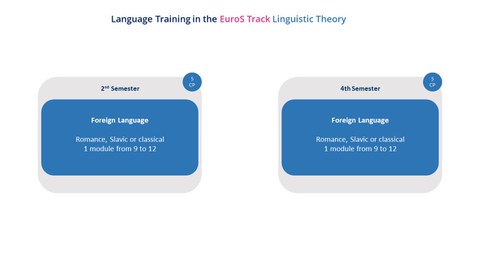
Sprachausbildung im Track "Sprachtheorie"
In the Language Diversity track, you choose two language specializations; one language specialization worth 10 credit points and one language specialization worth 15 credit points. You can choose between the language specializations Slavic Languages, Romance Languages and Classical Languages. Within each language specialization, you choose a language in ascending order of level. You can choose from Russian, Polish, Czech and Sorbian in the Slavic languages specialization, French and Italian (Spanish or Portuguese on request) in the Romance languages specialization and Latin and Greek in the Classical languages specialization.
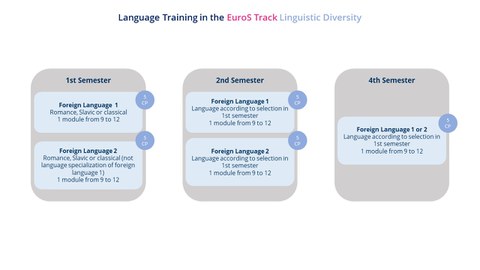
Sprachausbildung im Track "Sprachenvielfalt"
The structure of the language modules is based on the levels of the Common European Framework of Reference for Languages (CEFR). Further details on language course selection can be found in the Sprachausbildung section.
Mobility window
In the third semester, either a stay at a foreign university (stay abroad) or an internship in Germany or abroad amounting to 30 credit points must be completed. The third semester is designed in such a way that it is particularly suitable for a temporary stay at a foreign university (mobility window). Part-time study is possible in accordance with the regulations on part-time study. In addition to studying abroad, there are various options for organizing your stay abroad.
If you decide to do an internship, in addition to the internship contract, a short report reflecting on your experiences must be written and submitted to the Graduate Adviser no later than one month after the last day of the internship. Please discuss your internship plans with the Graduate Advisor or the Student Advisor beforehand. The internship should be at least 300 hours long. You can find internships, for example, via the linked job exchanges on the Jobs and Internships page. Furthermore, the faculty's centers, namely the Centrum Frankreich, the Centro di Studi Italiani (CSI) and the Center for Central and Eastern Europe Studies, also offer internships.
Master's thesis
Based on the results of the "Abschlussmodul", students complete their Master's thesis in the second half of the second year of study.
The Master's thesis takes 17 weeks to complete and 20 credit points are earned. Registration takes place via the examination office using a form .
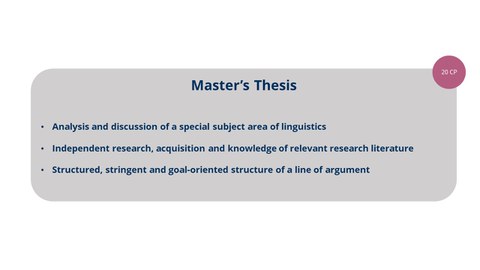
Masterarbeit
Under the following link you will find the Master's theses supervised so far in the "European Languages" degree program.
In the current EuroS Flyer 2022 you can find an overview of the modules of the Master's program.

